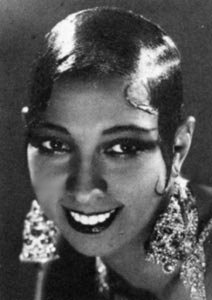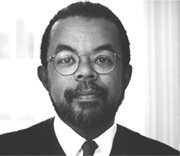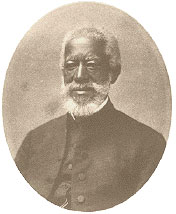Haile Selassie I (In History) - July 23, 1892 - August 27, 1975
 Haile Selassie I, was the Emperor of Ethiopia from 1930 – 1974. Born Tafari Makonnen in Ethiopia in 1892, he became the 111th emperor in the succession of the line of King Solomon. Upon being crowned emperor, he changed his name to Haile Selassie, meaning, "Might of the Trinity". Many world leaders consulted with him during his rule, such as Martin Luther King, Malcolm X, and Nelson Mandela. He fought to keep his country a sovereign nation and led the war when Italians intended to overtake Ethiopia. He also established the Organisation of African Unity (OAU) in 1963, headquartered in Addis Ababa. There are mixed emotions about Haile Selassie's reign, and although he accomplished such things as modernizing the government in Ethiopia, and abolishing slavery, his intentions were questioned. Some feel, that he may have cowardly run to Europe during the war, instead of being exiled. Some feel that slavery was abolished only to obtain entry into the League of Nations. Some question his actions in the face of Ethiopia's poverty and famine. However you view his reign, he was unquestionably instrumental in maintaining Ethiopia's independence and bringing an African Nation to the forefront of global politics, when most other nations were still in the midst of colonialism.
Haile Selassie I, was the Emperor of Ethiopia from 1930 – 1974. Born Tafari Makonnen in Ethiopia in 1892, he became the 111th emperor in the succession of the line of King Solomon. Upon being crowned emperor, he changed his name to Haile Selassie, meaning, "Might of the Trinity". Many world leaders consulted with him during his rule, such as Martin Luther King, Malcolm X, and Nelson Mandela. He fought to keep his country a sovereign nation and led the war when Italians intended to overtake Ethiopia. He also established the Organisation of African Unity (OAU) in 1963, headquartered in Addis Ababa. There are mixed emotions about Haile Selassie's reign, and although he accomplished such things as modernizing the government in Ethiopia, and abolishing slavery, his intentions were questioned. Some feel, that he may have cowardly run to Europe during the war, instead of being exiled. Some feel that slavery was abolished only to obtain entry into the League of Nations. Some question his actions in the face of Ethiopia's poverty and famine. However you view his reign, he was unquestionably instrumental in maintaining Ethiopia's independence and bringing an African Nation to the forefront of global politics, when most other nations were still in the midst of colonialism.Sites referencing Haile Selassie:
http://history.acusd.edu/gen/text/selassie.html
http://www.imperialethiopia.org/selassie.htm
http://www.jamaicans.com/culture/rasta/MarcusGarveyeditorial.shtml
http://www.infoplease.com/ce6/people/A0822368.html


 One of the great African intellectuals of the 20th century, Cheikh published the influential and controversial book, The African Origin of Civilization: Myth or Reality. His project was to identify the distortions about African history that we have learned and correct them for future generations. While he was studying in France, Cheikh Anta Diop was an avid political activist. From 1950 to 1953 he was the Secretary-General of the Rassemblement Democratique Africain (RDA) and helped establish the first Pan-African Student Congress in Paris in 1951. His first major work, Nations Negres et Culture (1955) shows the interrelationships between African nations, north and south, and proves that ancient Egypt was a distinct African nation and was not historically or culturally a part of Asia or Europe. Diop’s body of work has altered the historiography of Africa.
One of the great African intellectuals of the 20th century, Cheikh published the influential and controversial book, The African Origin of Civilization: Myth or Reality. His project was to identify the distortions about African history that we have learned and correct them for future generations. While he was studying in France, Cheikh Anta Diop was an avid political activist. From 1950 to 1953 he was the Secretary-General of the Rassemblement Democratique Africain (RDA) and helped establish the first Pan-African Student Congress in Paris in 1951. His first major work, Nations Negres et Culture (1955) shows the interrelationships between African nations, north and south, and proves that ancient Egypt was a distinct African nation and was not historically or culturally a part of Asia or Europe. Diop’s body of work has altered the historiography of Africa. A somewhat controversial Caribbean figure, Forbes Burnham is either well admired or passionately despised. An undeniable visionary of great intelligence, Burnham may have put his ambitions ahead of the good of his country. In 1949, he established a private practice and plunged into local politics, joining Dr. Cheddi Jagan’s Political Affairs Committee (PAC), which became the People’s Progressive Party (PPP) shortly thereafter. Five years later, he split from the PPP to form the People’s National Congress (PNC). The split caused a racial divide and civil unrest amongst the Afro-Guyanese and the Indian-Guyanese. He was the Prime Minister of Guyana from 1964, at which time he led his country to independence in 1966. He later became the first person to hold the office of President in 1980. He remained President until his death in 1985.
A somewhat controversial Caribbean figure, Forbes Burnham is either well admired or passionately despised. An undeniable visionary of great intelligence, Burnham may have put his ambitions ahead of the good of his country. In 1949, he established a private practice and plunged into local politics, joining Dr. Cheddi Jagan’s Political Affairs Committee (PAC), which became the People’s Progressive Party (PPP) shortly thereafter. Five years later, he split from the PPP to form the People’s National Congress (PNC). The split caused a racial divide and civil unrest amongst the Afro-Guyanese and the Indian-Guyanese. He was the Prime Minister of Guyana from 1964, at which time he led his country to independence in 1966. He later became the first person to hold the office of President in 1980. He remained President until his death in 1985.
 My family adored him so much they named me after his daughter. Michael Manley was one of the most outstanding political figures in the post-colonial history of the Caribbean. He served as Prime Minister of Jamaica for 11 years. As a politician, labour leader, author and intellectual, Manley made great contributions to Jamaican, Caribbean and international politics. Driven by a passionate concern for equality and justice, he helped to pioneer legislative programmes of social reform in the 1970s and had a role in the formation of the Caribbean Community (CARICOM) and later the Association of Caribbean States (ACS). He campaigned for a New International Economic Order (NIEO), and in defense of sovereignty for ex-colonial countries. His leading role among world statesmen in confronting racial oppression, especially in southern Africa, make him an international figure of enormous importance for world politics during the decade of the 1970s.
My family adored him so much they named me after his daughter. Michael Manley was one of the most outstanding political figures in the post-colonial history of the Caribbean. He served as Prime Minister of Jamaica for 11 years. As a politician, labour leader, author and intellectual, Manley made great contributions to Jamaican, Caribbean and international politics. Driven by a passionate concern for equality and justice, he helped to pioneer legislative programmes of social reform in the 1970s and had a role in the formation of the Caribbean Community (CARICOM) and later the Association of Caribbean States (ACS). He campaigned for a New International Economic Order (NIEO), and in defense of sovereignty for ex-colonial countries. His leading role among world statesmen in confronting racial oppression, especially in southern Africa, make him an international figure of enormous importance for world politics during the decade of the 1970s. Another personal favorite, I first encountered her story in high school while participating in a Sankofa dance group. Queen Nzingha of Ndongo belonged to the Mbundu, a large and ancient ethnic group that lived in modern-day Angola. Nzingha was a truly genius woman, whose unyielding desire for liberty and freedom for her people kept her at the forefront of the resistance against the Portuguese slave trade in her region. She was a visionary political and military leader who waged war against the Europeans. This war lasted for more than thirty years. One of Nzingha's greatest acts as Queen occurred in 1624 when she declared all territory over which she had control to be "Free Country". All slaves that were able to reach it from any region were forever free. This had a monumental impact, as thousands of slaves deserted Portuguese held areas to head for Nzingha's land, strengthening her armies in the process. Sadly, her death helped open the door for the massive Portuguese slave trade. Yet her struggle helped awaken others that followed her and caused them to mount their own offensives against the invaders. She is still known as a symbol of inspiration for people everywhere.
Another personal favorite, I first encountered her story in high school while participating in a Sankofa dance group. Queen Nzingha of Ndongo belonged to the Mbundu, a large and ancient ethnic group that lived in modern-day Angola. Nzingha was a truly genius woman, whose unyielding desire for liberty and freedom for her people kept her at the forefront of the resistance against the Portuguese slave trade in her region. She was a visionary political and military leader who waged war against the Europeans. This war lasted for more than thirty years. One of Nzingha's greatest acts as Queen occurred in 1624 when she declared all territory over which she had control to be "Free Country". All slaves that were able to reach it from any region were forever free. This had a monumental impact, as thousands of slaves deserted Portuguese held areas to head for Nzingha's land, strengthening her armies in the process. Sadly, her death helped open the door for the massive Portuguese slave trade. Yet her struggle helped awaken others that followed her and caused them to mount their own offensives against the invaders. She is still known as a symbol of inspiration for people everywhere.




 She was born in Belmont, Port-of-Spain, Trinidad in 1915. At the age of eight her family moved to Harlem, New York with her three sisters. She became involved in communism and black politics and by 1948 was elected onto the National Committee of the Communist Party of the USA. By 1948 she had become the editor of Negro Affairs for the party's paper the Daily Worker and had evolved into an accomplished speaker on human and civil rights. In 1955 she was deported from the US and given asylum in England. She founded and edited The West Indian Gazette. Claudia Jones founded the Notting Hill carnival, which she helped launch in 1959 as an annual showcase for Caribbean talent. Throughout her life she maintained an unwavering solidarity and a vision of the betterment of working-class people all over the world. What started out as a crusade for black working-class people became a crusade for all working-class people.
She was born in Belmont, Port-of-Spain, Trinidad in 1915. At the age of eight her family moved to Harlem, New York with her three sisters. She became involved in communism and black politics and by 1948 was elected onto the National Committee of the Communist Party of the USA. By 1948 she had become the editor of Negro Affairs for the party's paper the Daily Worker and had evolved into an accomplished speaker on human and civil rights. In 1955 she was deported from the US and given asylum in England. She founded and edited The West Indian Gazette. Claudia Jones founded the Notting Hill carnival, which she helped launch in 1959 as an annual showcase for Caribbean talent. Throughout her life she maintained an unwavering solidarity and a vision of the betterment of working-class people all over the world. What started out as a crusade for black working-class people became a crusade for all working-class people.
 Graduating from West Virginia State College summa cum laude with a degree in French and Mathematics, Katherine Johnson went on to become a teacher. Katherine G. Johnson started working for NASA with the tracking teams of manned and unmanned orbital missions. Ms. Johnson is an Aerospace Technologist at the National Aeronautics and Space Administration's Langley Research Center. She has worked on challenging problems of interplanetary trajectories, space navigation, and the orbits of spacecraft. The spacecraft include the Earth Resources Satellite, which has helped locate underground minerals and other earth resources. Ms. Johnson analyzed data gathered by tracking stations around the world during the lunar orbital missions -- the Apollo moon missions. Later, she studied new navigation procedures to determine more practical ways to track manned and unmanned space missions. For her pioneering work in the field of navigation problems, she was the recipient of the Group Achievement Award presented to NASA's Lunar Spacecraft and Operations team as well as many other awards.
Graduating from West Virginia State College summa cum laude with a degree in French and Mathematics, Katherine Johnson went on to become a teacher. Katherine G. Johnson started working for NASA with the tracking teams of manned and unmanned orbital missions. Ms. Johnson is an Aerospace Technologist at the National Aeronautics and Space Administration's Langley Research Center. She has worked on challenging problems of interplanetary trajectories, space navigation, and the orbits of spacecraft. The spacecraft include the Earth Resources Satellite, which has helped locate underground minerals and other earth resources. Ms. Johnson analyzed data gathered by tracking stations around the world during the lunar orbital missions -- the Apollo moon missions. Later, she studied new navigation procedures to determine more practical ways to track manned and unmanned space missions. For her pioneering work in the field of navigation problems, she was the recipient of the Group Achievement Award presented to NASA's Lunar Spacecraft and Operations team as well as many other awards.

 One of my personal favorites, Josephine Baker wasn’t just an entertainer. Starting off at the young age of 13, Josephine entered the world of entertainment. She eventually ended up in Europe where she was able to grow as an actress in ways that would not have been available to her in the US. She eventually became the first black woman to achieve international stardom. During World War II, Baker worked for Charles de Gaulle's Free French, to fight against the Nazi’s. She provided cover for military intelligence officers and later served as a spokesperson for the cause in North Africa. For her work, she was awarded the Croix de Guerre and the Medal of the Resistance. Returning to the US for a short while, Baker fought for equality in the US. She insisted on a nondiscrimination clause in her contracts, and refused to perform at clubs that were not integrated. Adoptive mother of 12 children of various races, Baker hoped to create a community of racial harmony, “The Rainbow Tribe”.
One of my personal favorites, Josephine Baker wasn’t just an entertainer. Starting off at the young age of 13, Josephine entered the world of entertainment. She eventually ended up in Europe where she was able to grow as an actress in ways that would not have been available to her in the US. She eventually became the first black woman to achieve international stardom. During World War II, Baker worked for Charles de Gaulle's Free French, to fight against the Nazi’s. She provided cover for military intelligence officers and later served as a spokesperson for the cause in North Africa. For her work, she was awarded the Croix de Guerre and the Medal of the Resistance. Returning to the US for a short while, Baker fought for equality in the US. She insisted on a nondiscrimination clause in her contracts, and refused to perform at clubs that were not integrated. Adoptive mother of 12 children of various races, Baker hoped to create a community of racial harmony, “The Rainbow Tribe”.









